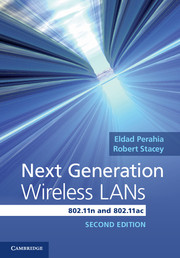Book contents
- Frontmatter
- Contents
- Foreword
- Preface to the first edition
- Preface to the second edition
- List of abbreviations
- Chapter 1 Introduction
- Part I Physical layer
- Part II Medium access control layer
- Chapter 8 Medium access control
- Chapter 9 MAC throughput enhancements
- Chapter 10 Advanced channel access techniques
- Chapter 11 Interoperability and coexistence
- Chapter 12 MAC frame formats
- Part III Transmit beamforming, multi-user MIMO, and fast link adaptation
- Index
- References
Chapter 9 - MAC throughput enhancements
from Part II - Medium access control layer
Published online by Cambridge University Press: 05 June 2013
- Frontmatter
- Contents
- Foreword
- Preface to the first edition
- Preface to the second edition
- List of abbreviations
- Chapter 1 Introduction
- Part I Physical layer
- Part II Medium access control layer
- Chapter 8 Medium access control
- Chapter 9 MAC throughput enhancements
- Chapter 10 Advanced channel access techniques
- Chapter 11 Interoperability and coexistence
- Chapter 12 MAC frame formats
- Part III Transmit beamforming, multi-user MIMO, and fast link adaptation
- Index
- References
Summary
Early on in the 802.11n standardization process it was recognized that even with significantly higher data rates in the PHY the fixed overhead in the MAC protocol was such that little of that gain would be experienced above the MAC. It was clear, as this chapter will show, that without throughput enhancements in the MAC the end user would benefit little from the improved PHY performance.
The throughput enhancements introduced in 802.11n are reused in 802.11ac. Some aspects of 802.11n, particularly A-MPDU and HT-immediate block ack, that were challenging to implement at the time 802.11n was developed are now widely adopted.
Reasons for change
Since the original 802.11 specification was completed, a number of amendments have introduced new PHY capabilities and with them enhanced performance. In addition, the 802.11e amendment, which primarily added QoS features, also enhanced MAC performance with the introduction of the TXOP concept and block acknowledgement. However, these MAC performance improvements were only slight, and with the potential for significantly higher PHY performance it was soon realized that the existing MAC protocol did not scale well with PHY data rate.
Information
- Type
- Chapter
- Information
- Next Generation Wireless LANs802.11n and 802.11ac, pp. 248 - 270Publisher: Cambridge University PressPrint publication year: 2013
